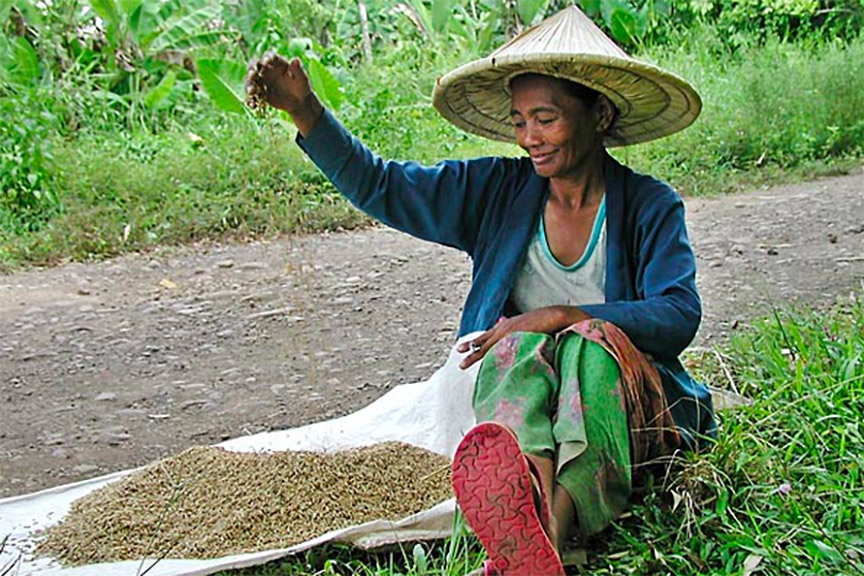SAN FRANCISCO, Agusan del Sur (MindaNews / 25 Feb) – Soon, agrarian reform farmers in four municipalities of this province will no longer sell their palay to middlemen and traders.
 Winnowing rice in Bunawan, Agusan del Sur. MindaNews file photo by BOBBY TIMONERA
Winnowing rice in Bunawan, Agusan del Sur. MindaNews file photo by BOBBY TIMONERA
This will be realized in April when a large-scale dryer and multi-pass rice milling plant in Trento town is expected to be opened where the farmers themselves will already become rice suppliers, initially to government institutions with huge demand of their produce.
The P26.9-million plant—fully equipped with facilities like a multi-pass rice mill, recirculating mechanical batch dryer, five solar dryers, a 10-wheeler winged van hauler truck, a six-wheeler truck and a warehouse—is a project of the Department of Agrarian Reform under the Convergence of Value Chain Enhancement for Rural Growth and Empowerment (Project ConVERGE).
The large-scale dryer and rice milling plant are jointly funded by the International Fund for Agricultural Development (IFAD) and the Philippine government as part of Project ConVERGE’s P110-million allocation for the agrarian reform farmers in the municipalities of Veruela, Trento, Bunawan and Sta. Josefa, or what is collectively called as the VETREBUNS cluster known for its rice production, processing and marketing.
Local government units in the VETREBUNS cluster allotted 20 percent of the project’s costs as their counterparts.
The plant will be operated by the Southern Agusan Seed Producers Cooperative (SASEPCO), which will serve as consolidator of the rice produce from three other agrarian reform beneficiaries’ organizations: Kahugpungan sa Malahutayong Mag-uuma Para sa Ekonomikanhong Kalambuan (KAMMPE), La Fortuna Multi-Purpose Cooperative (LAMUPCO) and Baug CARP Beneficiaries Multi-Purpose Cooperative (BARBMPC).
Already, the organized agrarian reform farmer cooperatives have cornered a P16-million rice supply deal with the Department of Social Welfare and Development after winning the competitive government bidding.
They were able to secure a certification from the Philippine Government Electronic Procurement System (PHILGEPS) with the technical assistance and capability building training from the DAR Provincial Office in Agusan del Sur.
The Bureau of Jail Management and Penology and the D.O. Plaza Memorial Hospital will follow suit in ordering thousands of bags of rice from them.
Jamil P. Amatonding Jr., Provincial Agrarian Reform Program Officer II, said the farmers under Project ConVERGE will be liberated from the cudgels of middlemen and unscrupulous traders since they will no longer sell their palay at the lowest farm gate prices and instead become productive rice entrepreneurs.
Amatonding said the project, when realized in April, will in a way address the problems of farmers from the negative effects of the Rice Tariffication Law (RTL), which also affected farmers in the VETREBUNs cluster.
Maximo Gegato, SASEPCO manager, said 20 of their 200 members stopped planting rice and instead grew bananas because of heavy losses in their harvest last year as a result of declining prices of palay.
He said traders pegged the palay prices at P700 to 800 per 50-kilo bag from what used to be P1,000 to P1,400 before the implementation of RTL.
But Amatonding assured that the sad plight of the farmers on the bad effects of RTL will be a thing of the past as the VETREBUNS farmers are expected to increase their yield by 30 percent when they will fully benefit from the cost-effective mechanized farming system.
Apart from the large-scale dryer and rice milling plant, agrarian reform organizations not only from the VETREBUNS cluster received a total of P17-million worth of modern farm machineries and equipment during the turnover ceremonies here on February 13.
Project ConVERGE allotted P13.7 million while the Climate Resilient Farm Productivity Support Project (CRFPSP) earmarked P3.
3 million for the distribution of mechanized farm inputs.
The machineries and equipment distributed to 10 agrarian reform beneficiaries organizations include farm and hand tractors, collapsible portable dryers, rice combine harvesters, water pumps, mud boats, shredder and a substrate mixer.
Amatonding said the modern farm inputs would boost the production of the rice farms while significantly reducing the expenses incurred, especially during the planting season.
Based on the results of their strategic plan with the farmers, Amatonding said expenses will be reduced significantly from what used to be P37,000 per hectare, which drove the farmers further into the quagmire of indebtedness from the traders.
He explained that if a farmer yields P74,000 per hectare, with the mechanized inputs that lessen their expenses, a net income will go as high as P45,000 to P50,000 per hectare.
Undersecretary Bernie Cruz, of DAR’s Foreign Assisted and Special Project Office (FASPO), in his speech, told the farmers in jest that he hoped they would become rice cartels in the province when he will return in April.
“We always consider the welfare of our farmer-beneficiaries in consonance with President [Rodrigo] Duterte’s mandate to pursue a more aggressive and genuine agrarian reform program and ensure that they are provided with the needed support services to increase their household income,” Cruz said. (Chris V. Panganiban / MindaNews)
